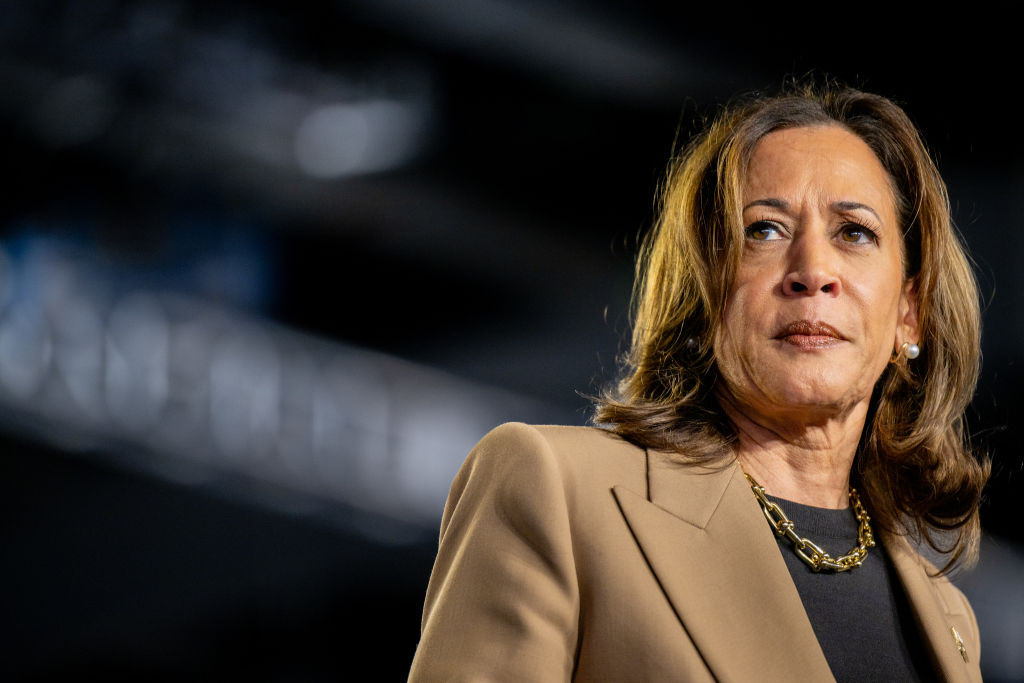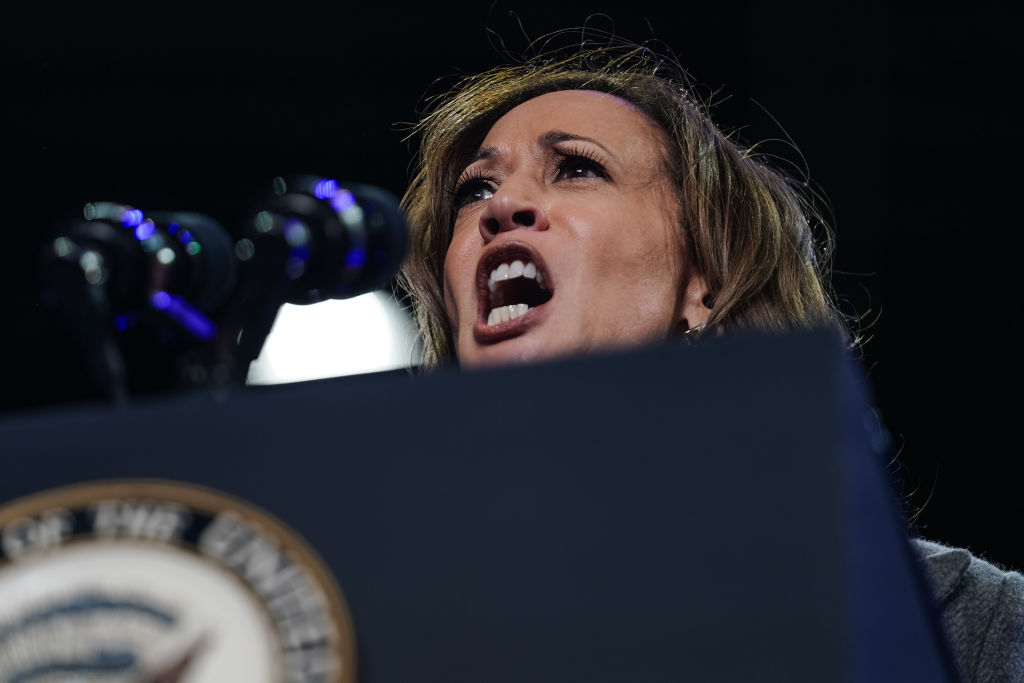Freedom, once lost, is lost forever.
The Censorship Industrial Presidency

Kamala Harris would serve as the avatar of an enormous anti-speech bureaucracy.
If Kamala Harris wins the presidency, she will sit atop the most potent speech and information cartel in modern times—a sprawling and labyrinthine network that has been appropriately dubbed the censorship industrial complex. It exists as a partnership between government bureaucracy and private industry, academia, and media. Its operatives disguise their sinister aims with banalities like “trust and authenticity,” “information security,” and “cyber threats.” The various branches of this enterprise are aligned toward a singular goal: extending the reach of the federal government into the minds of Americans.
The censorship cartel was spawned during Barack Obama’s presidency but flourished under that of Joe Biden, whose administration defended it all the way to the Supreme Court. It is certain to continue under a future Harris Administration. Her potential vice president, Tim Walz, has openly speculated on the limits of the First Amendment as congressional Democrats furiously attempt to paint repeated exposés of government censorship as nothing more than a Republican fever dream.
But this is more than partisan ragebait. Over the last several years, investigations and document requests have revealed just how sprawling the censorship apparatus is, and how wide are its aims. It doesn’t seek to simply cut off disfavored speech and opinion. According to congressional testimony, the Cybersecurity and Infrastructure Security Agency (CISA), housed at the Department of Homeland Security, developed protocols to “discredit individuals as a necessary prerequisite for demanding censorship against them,” along with training influencers to spread pro-censorship messages, and urging banks to cut off financial services to people organizing rallies or events in 2020.
At the State Department, an office called the Global Engagement Center (GEC) turned its “counter-messaging” operation—originally focused on disrupting ISIS propaganda—toward Americans when it used its taxpayer-funded mission to take revenue away from American businesses like the New York Post, the Federalist, and RealClearPolitics. One congressional investigation found that GEC “circumvented its strict international mandate” by funding private contractors with “domestic censorship capabilities.”
Even Meta CEO Mark Zuckerberg has come clean about the demands the Biden government imposed on his company, to which Meta uncritically acquiesced. “In 2021, senior officials from the Biden administration, including the White House, repeatedly pressured our teams for months to censor certain COVID-19 content,” Zuckerberg wrote in a letter to House Judiciary Committee Chairman Jim Jordan. He also confirmed that the FBI’s nebulous warning to them about forthcoming “Russian disinformation” played a role in Meta’s demotion of the Hunter Biden laptop story.
It’s alarming enough that the government can successfully pressure the world’s biggest speech platforms. But it’s only the beginning. As the CISA example demonstrates, the ultimate goal of the speech cartel is something along the lines of a social credit system—think the wrong things, say the wrong things, and not only can you not speak in what is effectively the modern public square, you cannot access the levers of capitalism: banks, e-commerce, crowdsourcing platforms, and the rest of the online world, which now makes life in the analog world possible.
Reign of the Bureaucrats
The clearest example of this joint public-private apparatus of suppression was after January 6, when Bank of America—of its leaders’ own volition, not at any government request—provided the FBI with the names of customers who had made a purchase with their credit or debit cards in the Washington, D.C. area between January 5 and January 7, 2021, and had previously bought a firearm or ammunition anywhere. “So if you went to South Dakota to go pheasant hunting in 1996,” former FBI intelligence analyst George Hill told The Free Press, “you went to the top of that list.”
The country’s financial sector has become increasingly political. Major banks like JP Morgan Chase, Wells Fargo, and Citigroup regularly decline to provide depository services to religious nonprofits and contractors who work with Immigrations and Customs Enforcement, or process certain firearms transactions. After January 6, outgoing President Donald Trump was debanked, as were his wife Melania and son Barron.
For many on the modern Left, this state of affairs is not simply acceptable but desirable. Democrats see themselves as “protecting democracy” when they streamline George Soros’s purchase of 200 radio stations before an election, while demanding at the same time that cable and streaming providers drop Fox News, One America News Network, and Newsmax. And no one represents the modern Left like Kamala Harris, who would be the most useful instrument of progressive ambition to occupy the White House in a generation.
Spend one afternoon watching her on the campaign trail, and it’s clear you are not electing a person in charge of her own mind. You are electing Kamala, Inc.—less an individual than a vector for the committees of progressives who will control her. The censorship industrial complex has all the programming; they just need a puppet to push the buttons. Kamala Harris is perfect for their purposes.
Hypothetically, of course, Donald Trump could use these same powers for ill to tame and politically torture his left-wing opponents, just as they have done to him and his supporters. But Democrats, eager to impute every possible abuse of power to Trump, don’t make this argument. That’s because they know the censorship industrial complex has only one master: them.
The project is built on a shared ideological understanding between government bureaucrats and the media, academia, and tech companies required to construct a façade of First Amendment compliance. The government isn’t “directing” these companies to do anything—or so the Biden Administration claimed at the Supreme Court. The companies could always have said no. They just didn’t choose to do so.
Of course they didn’t. Because the corporate, media, and academic power centers of America agree with the Left’s totalitarian project, either out of genuine commitment to the groupthink or cowardly fear of ending up in its crosshairs. This group sees their moral imperative as destroying Donald Trump and his supporters, not helping them.
Worse still, these “trust and safety” and “pro-democracy” offices operate in the deepest, darkest bowels of the federal leviathan, staffed by contractors and bureaucrats who flit around the basements of power pushing paper and forming “private partnerships” with their own agenda, outside any executive purview. Even if Donald Trump is elected and makes it his day-one mission to eliminate them, it will take a dedicated, combined effort of executive will and congressional tenacity. The censors know the tunnels of bureaucracy better than anyone. They will not go quietly, or easily. They never do.
Kamala Harris will, unwittingly or intentionally, give the censorship industrial complex control of the government. The country will be profoundly altered as the offices and associations that currently exist at the periphery take over the powerful levers of executive agencies. The First Amendment will still exist by the letter of the law. But in practice it will be a legal afterthought: the cute anachronism of a freer, and therefore more dangerous, age.
The American Mind presents a range of perspectives. Views are writers’ own and do not necessarily represent those of The Claremont Institute.
The American Mind is a publication of the Claremont Institute, a non-profit 501(c)(3) organization, dedicated to restoring the principles of the American Founding to their rightful, preeminent authority in our national life. Interested in supporting our work? Gifts to the Claremont Institute are tax-deductible.
The dire consequences of a stolen election.
Elon Musk is the only thing standing in the way of the war on “disinformation.”



